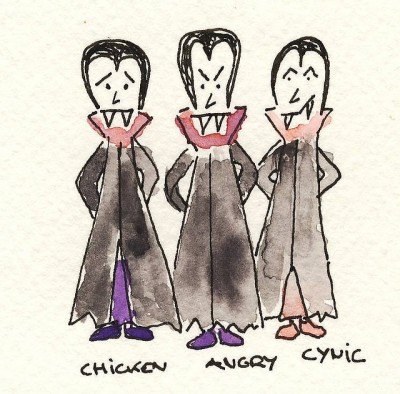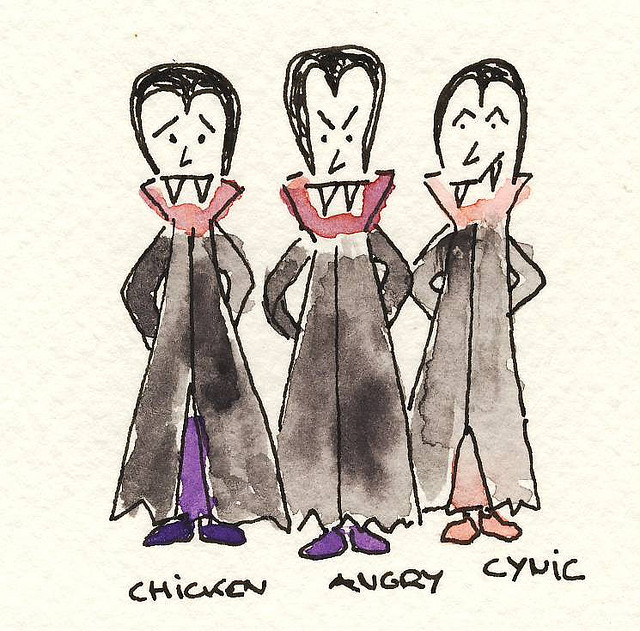
If you want to receive something from another person, often you have to do something for them at some point first. This week’s parsha, Bechukotai, shows us that even God is aware of this part of human nature. The parsha starts with God saying, “Hey, I get it! You’re selfish, and I can’t expect you to just do something I ask you, so here are a ton of blessings you will receive” (Leviticus 26.3-13). God also seems to understand the idea of softening bad news with good news first, as God moves immediately to listing what will happen if you don’t follow the commandments. Personally, the curses sound a lot worse than the blessings.
I want to try and stay positive and I don’t want to scare everyone, so I’m going to just focus on those blessings. Most of them are pretty nice: our fields will flow, and we won’t want for anything. One blessing, though, seems to stand out from the rest. In Leviticus 26.6, we are promised “I will grant peace in the land, and you will lie down without fear, and I will stop the evil beasts from the land and sword[s] will not pass through your land”. Rashi, a medieval scholar whose commentary is a vital part of Torah study, teaches here that peace is as important as all the other blessings put together. I think we can all agree with Rashi here—great food and drink isn’t worth much if we must go to bed each night scared that we may not wake up, or that something, or someone, will kill us or our families the next day.
There only is one problem with this, my positivity be damned—the next lines are not at all what we could call a state of peace: “You will pursue your enemies, and your enemies will fall by sword before you. Five from among you will pursue one hundred, and one hundred from among you will chase 10,000, and your enemies will fall by the sword before you.” Hardly what we would call peace.
The text seems to contradict itself, too—you will have peace, and you will pursue and slaughter your enemies. Perhaps what the text considers to be peace is different from today’s definition. Peace isn’t a lack of violence, the world will always be violent, peace is really just security. Even if no sword enters your land, the people around you will keep fighting each other. Sounds lovely, right? What about the idea of being a light to the nations? What about Isaiah’s prophecy of “nation shall not lift sword to nation, and they will no longer learn war”?
You can’t teach others how to behave if you can’t behave yourself. How can we be a light to other nations, preaching peace, when we can’t even be at peace within ourselves? The peace that is promised by the Torah, if we were to follow the Torah, is explicitly within our own land, our own borders, in order to teach us this.
The Torah isn’t just saying that you will magically feel at peace by following it. The Torah actually gives us guidelines that could create a state of peace in our lives. Through the Torah, we can learn to appreciate what we have, create a balance in our lives, respect others, and control ourselves. Whether we believe in God or not, there are lessons to be learned in the study of Torah that can help us find peace, to lie down at night with fewer worries to keep us up and raise our blood pressure.
Now that we have reinterpreted “peace in the land” as “peace within the heart”, the earlier contradiction is not as difficult. Being at peace within yourself is just that—it’s within yourself not everyone else. Unfortunately, those around you won’t necessarily be at peace. In college, we have friends spiraling out of control, loved ones with relationship difficulties, and peers who seem to have sticks up their… tuchuses. It can be difficult to stay at peace when you are surrounded by other stressed out folks.
The Torah provides us with two tips when surrounded by those at war, both for when they are at war with each other and for when they are at war with themselves. The first is pretty straightforward, we must keep to our paths, continuing to practice what it was that brought us success. Keep studying Torah (i.e. keep reading my articles).
In Jon Gordon’s The Energy Bus, he teaches that one of the steps on the path towards a happier, more positive life is removing what he calls energy vampires from your life. The text says, “you will pursue your enemies, and your enemies will fall.” Could that be the equivalent of cutting our energy vampires out of our lives? Yes we do need to keep others’ battles, those that can destroy our own peace, outside our personal borders. But we must do this without cutting those we love out of our lives.
Those lines that originally caused problems suddenly become the solution: “Five from among you will pursue one hundred, and one hundred from among you will chase 10,000.” If you do the math, it doesn’t really work. Why? To teach us that 5 people are great, but 100 are even stronger. It reminds me of a lesson I had in elementary school—take one or two arrows and try to break them, no problem, but take a huge bundle? It’s a lot more difficult.
To bring peace to the world, you must find peace within yourself, but to maintain that peace you must find others who are seeking the same. Together, you can build a community, a circle of friends. Together, the energy vampires won’t be strong enough to break your peace. When they see you and your peers, they will know that they too want this peace, and perhaps even join you in seeking their own peace.
David Gutbezahl is a student at Gratz College.

